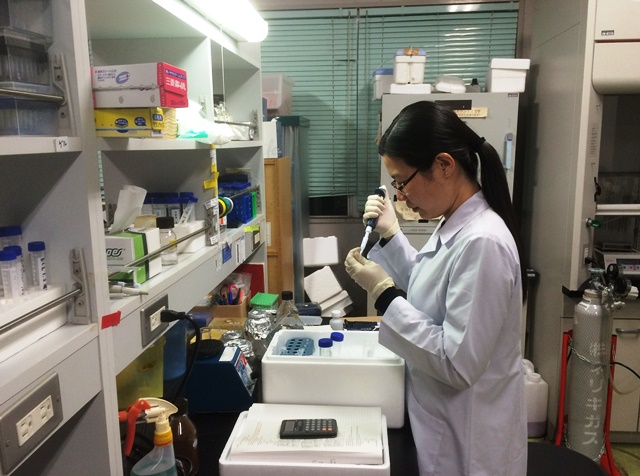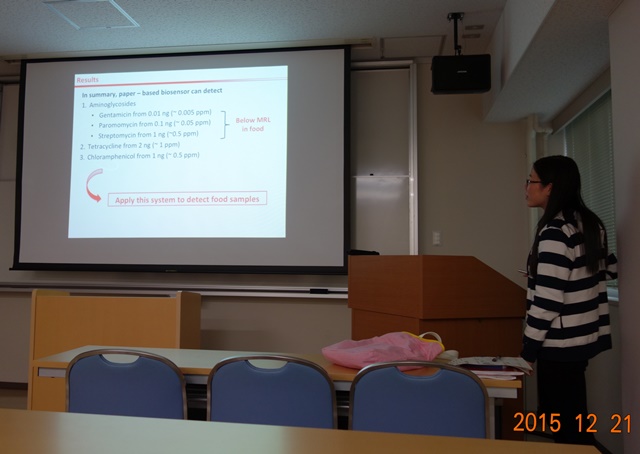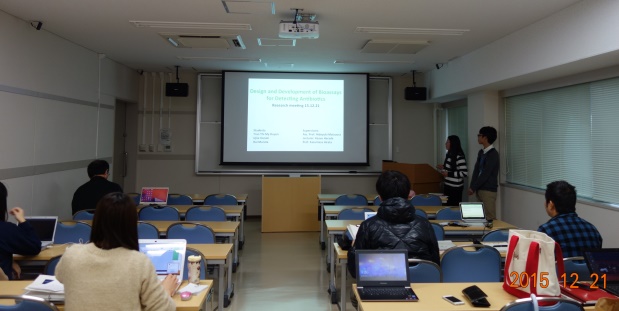Interview with a scholarship researcher in Japan (PhD course in Osaka University)
Ms. Tran Thi My Duyen, who is a lecturer of Can Tho University (CTU), has been studying in Osaka University Graduate School of Pharmaceutical Sciences Applied Environmental Biology Lab since 2013. She is a scholarship researcher of the Ministry of Education, Culture, Sports, Science and Technology-Japan (MEXT), whose study theme is to develop a detection method of antibiotics residues so as to complete her PhD degree. Ms. Duyen responded to the interview as follows.
 |
|
| Ms. Duyen working at Lab, Osaka University |
Q1 How about your life in Japan? Please introduce your daily life in Osaka University.
A1 My life in Japan is good so far. I start my day from 7:30 AM, have breakfast and prepare lunch box and dinner box before coming to lab. Like other students, I come to lab around 9:00 to 9:30 AM. Then, I usually drink a cup of coffee for more energy before starting my experiments. I go back home after finishing the experiments, usually after 8:00 PM or later.
Q2 What is your study theme?
A2 “Design and development of biosensor for detecting antibiotics” is my study theme. A biosensor is an analytical device composed of a biological element, such as cells, enzymes, or antibodies, and a detector element. There are currently so many antibiotics, but we focus on sulfonamides and aminoglycosides. Sulfonamides are so commonly abused in Vietnam now and there are not simple methods to detect aminoglycosides so far, which are the reasons why we focus on them. In order to construct a biosensor for sulfonamides, we are trying to utilize some target recombinant enzymes expressed in Escherichia coli as a sensing element. For an aminoglycoside biosensor, we are trying to construct a system for synthesizing reporter genes in cell-free transcription/translation reaction system.
Q3 What do you do every day in the laboratory (Osaka University)?
A3 My daily works in lab are mostly performing experiments, analyzing the experimental results. Otherwise, I need to check the experimental progress whenever something wrong happen in my experiment or look for literature why those problems happened then prepare for the next experiments. I have weekly discussion with Dr. Matsuura on Monday morning. In this discussion, I present him what I have done, what problems I have met and what I would like to do next then he always gives me a lot of valuable comments to get better results. In many cases, Dr. Matsuura spends time to discuss with me whenever I have experimental problems. I am so thankful for his precious time and advices.
Q4 After finishing your PhD, what do you want to do in Vietnam, at Can Tho University?
A4 After finishing my PhD, I will come back to Vietnam and work at Can Tho University. I wish to improve my PhD research to a construction of biosensor for monitoring Sulfonamides and Aminoglycosides residues not only in environmental samples but also in processed foods.
Q5 Any other messages from you ?
A5 I would like to express my deep gratitude to Prof. Hirata, Dr. Harada, and Dr. Matsuura for their constants support and scholarly guidance since the beginning of my study. My special thank goes to Prof. Nguyen Thanh Phuong for giving the chance to apply for this scholarship. Last but not least, I would like to thank SATREPS project and Japanese government (MEXT) for providing me a scholarship to conduct my PhD research in Osaka University, Japan.
  |
|
Presentation by Ms. Duyen |





